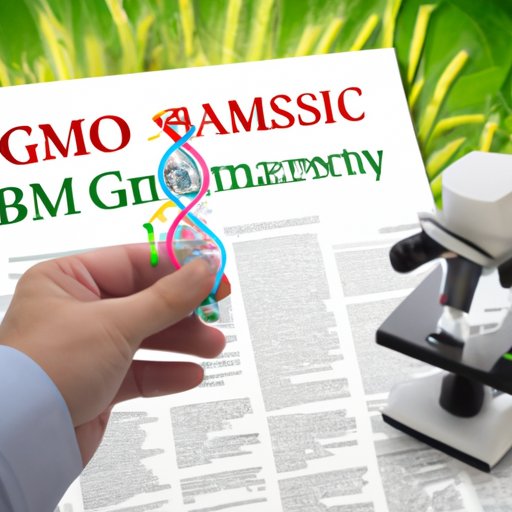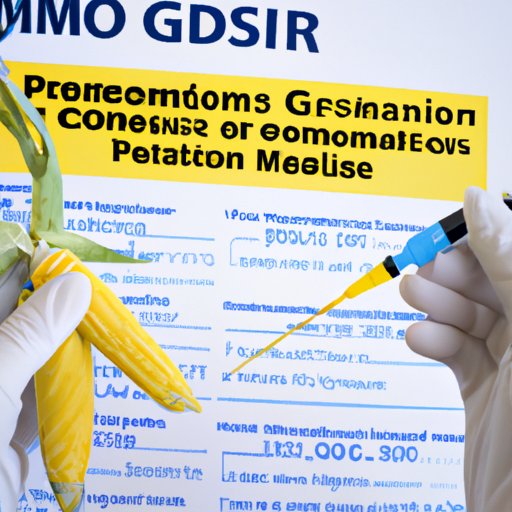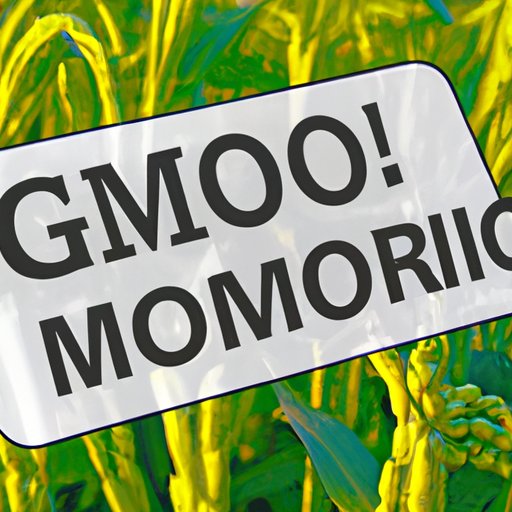Introduction
Genetically modified organisms (GMOs) are living organisms whose genetic material has been artificially altered in a laboratory. The objective of this process is to create plants and animals that are more resistant to disease, pests, and drought, have improved nutritional value, or have other desirable traits. In recent years, there has been much debate about the potential health risks posed by consuming GMOs and their impact on the environment. This article will explore the evidence for and against GMOs and their effect on human health.

Examining the Scientific Evidence of GMOs Effects on Human Health
The scientific evidence regarding the effects of GMOs on human health is inconclusive. Some studies have suggested that consuming GMOs may cause health problems such as allergies, organ damage, and antibiotic resistance. However, other studies have not found any significant health risks associated with consuming GMOs. The World Health Organization (WHO) has concluded that “no effects on human health have been shown as a result of the consumption of such foods by the general population in the countries where they have been approved.”
It is important to note that the research into the potential health risks of consuming GMOs is ongoing and that further study is needed to fully understand their effects on human health. To date, most of the studies examining the effects of GMOs on human health have been conducted on animals, and the results have not been conclusive. Therefore, it is difficult to draw definite conclusions about the potential risks associated with consuming GMOs.

Investigating the Potential Risks Associated with Consuming GMO Products
One of the potential risks associated with consuming GMO products is the possibility of unintended consequences of genetic engineering. For example, when genes from one organism are transferred to another, it can lead to the creation of new proteins that could be allergenic or toxic to humans. Additionally, the transfer of genes between species could lead to the emergence of new diseases or the spread of existing diseases to new species.
Another potential risk posed by consuming GMOs is the potential for them to cause long-term health issues. There is evidence that some GMO products contain increased levels of herbicides and pesticides, which could lead to an increased risk of certain types of cancer and other diseases. Additionally, some GMO crops have been shown to contain lower levels of essential nutrients than their non-GMO counterparts, which could lead to nutritional deficiencies over time.

Exploring the Ethical Implications of Using GMOs in Food Production
The use of GMOs in food production also raises ethical concerns. There are concerns that the use of GMOs could lead to the displacement of small farmers, as larger companies may be able to produce GMO crops more cheaply and efficiently. Additionally, there are concerns that the use of GMOs could lead to the erosion of biodiversity, as genetically modified crops may be less diverse than traditional crops.
Furthermore, the use of GMOs in food production could have adverse environmental impacts. For example, the use of herbicides and pesticides used in the production of GMOs could contaminate soil and water, leading to ecological damage. Additionally, the release of genetically modified organisms into the environment could lead to the spread of diseases to wild species.
Highlighting the Benefits of GMO Products for Improving Public Health
Despite the potential risks associated with consuming GMOs, there are also potential benefits. For example, GMO products can improve nutrition and reduce food waste. Genetically modified crops are often designed to be more nutrient dense, meaning they can provide more vitamins and minerals than traditional crops. Additionally, GMO crops can be engineered to be resistant to pests and disease, meaning they can be stored for longer periods of time without spoiling.
GMOs can also increase yield and decrease the cost of production. Genetically modified crops can be designed to require fewer inputs (such as water or fertilizer) and to be more resilient to environmental conditions. This can lead to higher yields and lower costs for farmers, making food more affordable for consumers.
Evaluating the Potential Long-Term Consequences of Consuming GMO Foods
Despite the potential benefits of GMOs, there are still questions surrounding their long-term safety. It is possible that consuming GMOs could lead to unknown health issues that may not manifest until many years after consumption. Additionally, it is unclear how the introduction of GMOs into the environment could affect ecosystems in the long term.
To ensure the safety of GMO products, it is important to monitor and regulate their use. Governments should ensure that adequate safety testing is carried out on GMO products before they are allowed to enter the market. Additionally, governments should ensure that GMO products are labeled so that consumers can make informed decisions about what they eat.
Conclusion
In conclusion, the scientific evidence regarding the effects of GMOs on human health is inconclusive. While there is evidence that consuming GMOs can have both positive and negative effects on public health, more research is needed to fully understand the potential risks and benefits. Additionally, governments should ensure that adequate safety testing is carried out on GMO products and that they are properly labeled so that consumers can make informed decisions about what they eat.
(Note: Is this article not meeting your expectations? Do you have knowledge or insights to share? Unlock new opportunities and expand your reach by joining our authors team. Click Registration to join us and share your expertise with our readers.)
